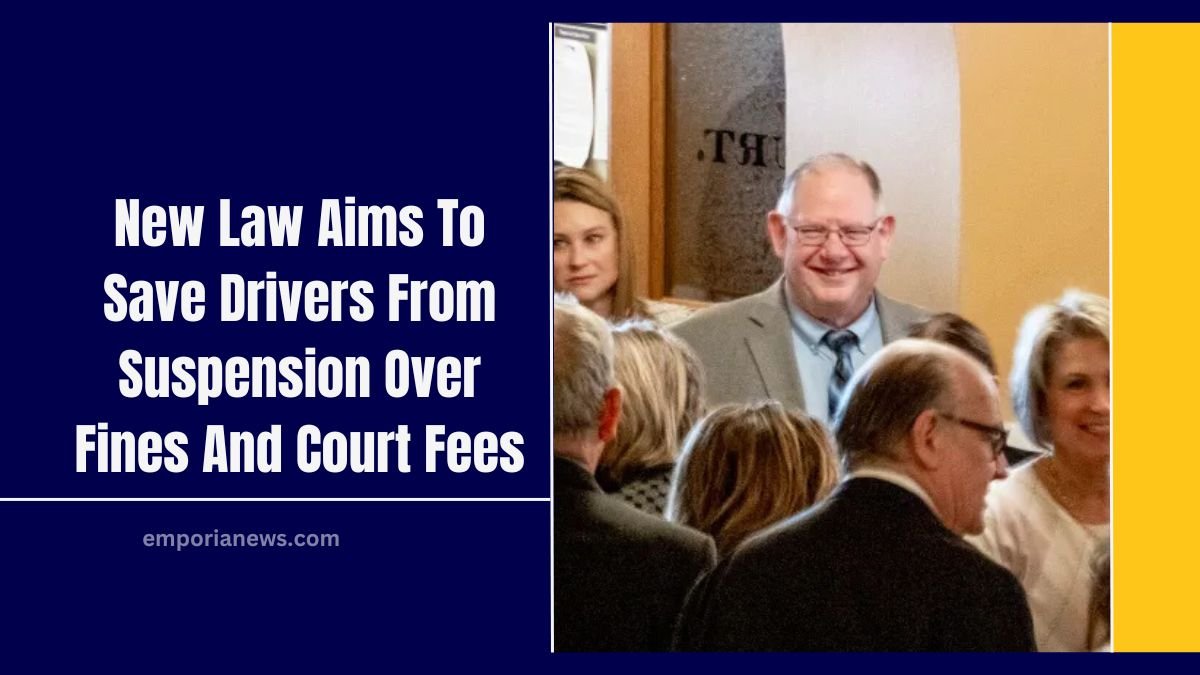Kansas has long been plagued by a punitive system that has left thousands of drivers without legal driving privileges for extended periods—sometimes for years—simply because they were unable to pay traffic fines and court fees.
With nearly 1 in every 15 drivers affected, the impact of suspended licenses reaches far beyond individual inconvenience, affecting economic opportunities and community mobility.
In response, a new law passed in the 2024 legislative session seeks to reform these penalties, providing a more compassionate and flexible approach to restoring driving privileges.
The Problem with the Current System
Under the old system, failure to pay fines or appear in court automatically triggered a suspension of a driver’s license.
Once suspended, many drivers found it nearly impossible to rectify the situation, particularly those in low-income brackets. Data from recent state records reveal that by the end of January, approximately 123,549 drivers had their licenses suspended due to non-compliance.
In Wichita, for example, some suspensions date back as far as 1997, leaving individuals without legal driving status for decades.
This harsh approach not only penalizes drivers for financial hardships but also has broader consequences. Studies indicate that a significant number of drivers with suspended licenses continue to drive illegally, increasing the risk of additional violations, criminal charges, and further fines.
The compounding effect of these penalties creates a cycle that disproportionately impacts low-income Kansans and overburdens municipal courts.
Key Changes Introduced by the New Law
The recently enacted law marks the first substantial change to Kansas’s driver’s license penalty system since 2021.
Its primary objective is to bridge the gap between failing to pay fines and the actual suspension of driving privileges, thereby offering drivers a pathway to regain legal status while they work to resolve outstanding issues.
Major Reforms Include:
- Grace Periods and Extended Timelines:
The new law introduces a 30-day period for drivers to pay fines or appear in court before a suspension is initiated. Additionally, after non-payment, a 60-day window is provided during which drivers can engage with the court system to arrange payment plans or apply for hardship waivers. - Restricted Licenses:
Rather than an outright suspension, drivers may now receive a restricted license. This license allows travel for essential purposes such as commuting to work, grocery shopping, attending medical appointments, or fulfilling court orders. - Substantial Compliance Provision:
Judges now have the discretion to determine if a driver has achieved “substantial compliance” with court orders—such as attending diversion programs or establishing a payment plan—even if minor fines remain unpaid. This flexibility can prevent the harsh consequences of automatic suspensions. - Capped Reinstatement Fees:
The law caps reinstatement fees at $100 per case, rather than charging per citation. This change aims to alleviate the financial burden on drivers seeking to restore their licenses. - Enhanced Access to Restricted Privileges:
Programs like the manifest hardship program will continue to assist drivers in petitioning for fee waivers based on financial need, a measure already popular in Wichita where courts have waived millions in fines.
Understanding License Statuses in Kansas
The new law directly impacts three key types of license statuses: restricted, suspended, and revoked. Each status comes with specific rules and limitations:
| License Status | Description | Allowed Activities |
|---|---|---|
| Restricted License | Issued when fines are unpaid but provides limited driving privileges. | Driving to work, grocery stores, medical appointments, and court-mandated activities. |
| Suspended License | Temporarily revokes driving privileges until fines are paid or court orders met. | No legal driving permitted until suspension is lifted. |
| Revoked License | Most severe penalty; prohibits driving for a fixed period (typically three years) followed by strict reapplication conditions. | No driving permitted during revocation; reinstatement requires fulfillment of all conditions. |
The new law aims to prevent drivers from falling into the suspended or revoked categories too quickly by providing opportunities to resolve issues through restricted licenses and payment plans.
Benefits of the New Law
The reforms promise several key benefits for Kansas drivers, particularly those facing financial hardship:
- Reduced Economic Burden:
Drivers are given more time and flexibility to address fines without losing their driving privileges, thereby mitigating the negative impact on employment and daily life. - Encouraging Compliance:
By avoiding automatic suspensions, the law incentivizes drivers to engage with the court system and resolve outstanding fines, ultimately promoting a more cooperative approach. - Easing Court and Administrative Workloads:
With fewer automatic suspensions, municipal courts and state agencies can focus on more complex cases, streamlining the overall process. - Improved Road Safety:
Drivers with restricted licenses still have access to legal driving, reducing the risk associated with illegal driving and subsequent, more severe penalties.
Challenges and Areas for Improvement
While the new law is a significant step forward, it is not without its challenges. Legal experts caution that the effectiveness of the “substantial compliance” provision remains to be fully tested in courts.
Additionally, some drivers with multiple outstanding cases may still find it difficult to achieve full reinstatement even with the new flexibility.
Continuous monitoring and further legislative adjustments may be required to address these lingering issues.
Preparing for License Restoration
Drivers affected by fines and court fees are advised to:
- Review Notices Promptly:
Monitor any communications from the court or the Division of Vehicles and respond within the provided time frames. - Utilize Available Programs:
Explore options like the manifest hardship program to petition for fee waivers or payment plans. - Keep Records Up to Date:
Maintain accurate and current personal information to facilitate smoother communication and processing with state agencies.
The introduction of these reforms in Kansas represents a significant effort to balance accountability with compassion.
By extending the timeframe for drivers to address fines and offering alternatives such as restricted licenses, the new law aims to reduce the number of drivers facing long-term loss of driving privileges.
These changes are expected to alleviate the financial and social burdens on low-income drivers, support public safety, and streamline administrative processes.
As the new law continues to be implemented and refined, stakeholders remain hopeful that further adjustments will build on this positive momentum, ultimately creating a fairer and more efficient system for all Kansas drivers.




